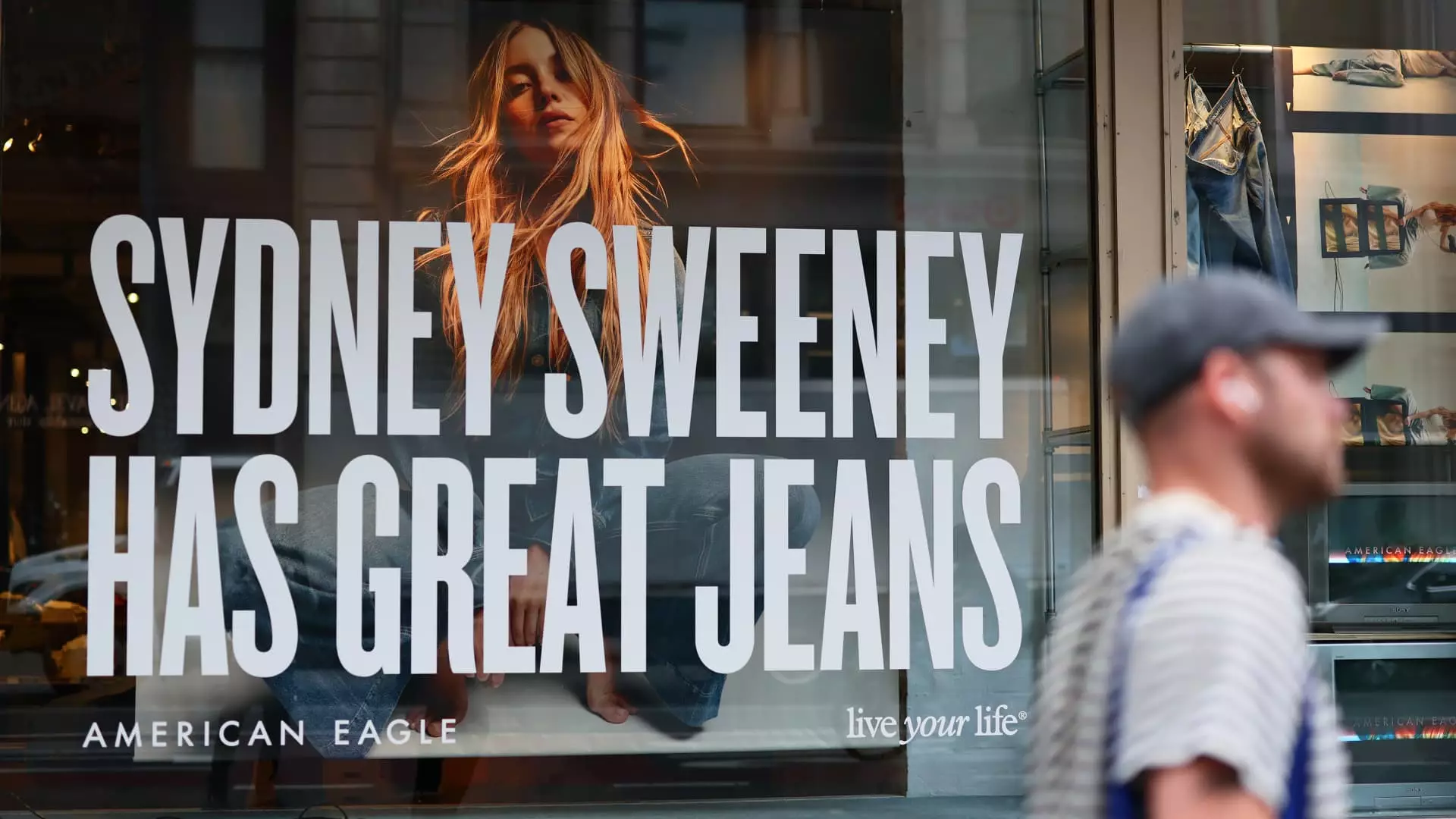In an era where marketing is as much about cultural resonance as it is about product quality, American Eagle’s latest campaign underscores the ongoing tension between traditional advertising standards and modern political sensibilities. The retailer’s choice of actress Sydney Sweeney—an individual with a conservative turn of phrase and, notably, a registered Republican—to front its fall marketing effort was no ordinary move. Instead, it stood as a deliberate statement that sought to align the brand with a subset of consumers who feel alienated by the hyper-woke branding that dominates much of contemporary marketing. Yet, this move isn’t without its risks, revealing the delicate tightrope corporations must walk when choosing to engage in political or cultural discourse.
American Eagle aimed to invoke a sense of authenticity and straightforwardness with the slogan “Sydney Sweeney has great jeans”—a phrase intended to celebrate casual, confident self-expression. But in doing so, the brand inadvertently tapped into a broader cultural controversy: the perception that advertising is increasingly saturated with politically charged messages or, conversely, that it fails to connect with the real-life values of its core demographics. This campaign seemed to serve as a resounding rallying cry for Americans who yearn for marketing that reflects their traditional sensibilities, but it also opened itself up to accusations of insensitivity and shallow stereotypes, especially as critics alleged the slogan had double meanings that referenced physical or genetic attributes rather than fashion.
The Aftermath of the Marketing Strike: Market Reactions and Cultural Backlash
The immediate financial impact on American Eagle was notable, with shares surging by 20%, driven in part by a tweet from former President Trump praising Sweeney’s “hot” ad and calling her “a registered Republican.” The effect was swift: the stock’s momentum signaled that, at least for some investors, the campaign had struck a chord. This illustrates an uncomfortable truth about the current market landscape—where political endorsements, social media avalanches, and cultural debates can influence stock prices more immediately and intensely than quarterly earnings.
However, this boost was ephemeral. Initially, the stock’s rise appeared to be fueled by meme-stock mania and speculative fervor. Over subsequent days, American Eagle faced mounting criticism from segments of its customer base and critics who claimed the ad objectified the actress and was disconnected from the evolving, more progressive aesthetic standards of today’s youth. In particular, detractors criticized the slogan for being overly sexualized and out of touch with the self-expression values that Gen Z and Millennials purportedly cherish. The company’s tame response—more or less reiterating that it was about jeans—failed to quell the controversy as debates raged over whether marketing should stay apolitical or deliberately cater to a cultural right-wing segment.
Implications extend beyond public relations. The company’s stock, which had suffered a 27% decline year-to-date, underscores that even attempts at cultural positioning can’t fully shield a brand from macroeconomic headwinds like rising tariffs, declining consumer spending, and internal operational challenges. The campaign is thus emblematic of the high-stakes game modern brands are playing—a blend of fashion, politics, and cultural signaling that can either reinvigorate a tired brand or hasten its obsolescence.
The Industry’s Broader Battle: Woke vs. Traditionalist Marketing
American Eagle’s experience is inherently tied to a broader societal debate over cultural values encoded within marketing and branding. On one side, brands like Bud Light have suffered significant backlashes due to overt attempts to align with progressive causes, illustrating the danger of “woke” marketing strategies that turn off core consumers. Conversely, the backlash against less progressive or more traditionally framed campaigns reveals the risks of alienating younger audiences who increasingly view brands as social voices rather than mere purveyors of apparel.
This battle isn’t purely about political correctness but about authenticity and cultural alignment. American Eagle’s campaign was clearly designed to appeal to a conservative segment that feels overlooked or dismissed by mainstream culture. Yet, in doing so, the company risks being labeled as reactionary or out of touch with the more inclusive standards that have become increasingly normalized, especially among younger consumers. The situation underscores how marketing initiatives are no longer merely commercial—they are cultural statements that can either bolster loyalty or destroy brand reputation.
The core question remains: is this a shrewd strategic move that taps into a neglected demographic, or is it a reckless gamble that will further polarize the company’s consumer base? The coming weeks, and more importantly, the upcoming earnings report, will reveal whether American Eagle’s cultural gamble pays off or backfires. Until then, the ongoing saga vividly illustrates the volatile interplay between marketing, politics, and consumer values in today’s polarized marketplace.

